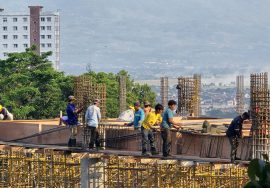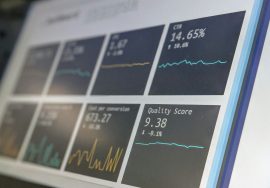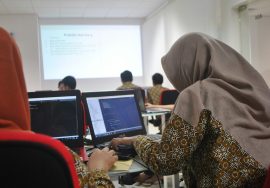
Monitoring and Evaluation for Food Security and Nutrition Course
Introduction
In order to achieve a world free of hunger and malnutrition, it is vital to provide sustainable solutions that provide the largest impacts on development outcomes. Monitoring and Evaluation tools and techniques plays a key role in ensuring Food Security programs are designed, implemented as plan and that they improve the well-being of the target communities. This course equips the participants with adequate skills to develop and manage robust M&E systems for effective management of FSN programs. The learner is introduced to FSN indicators, tools and techniques for M&E in FSN.
Who Should Attend?
This is a general training is targeting variety of programme staff, management team members and thematic staff, Project Management Officials, government officials, programme managers; policy makers and programme implementers; development practitioners and activists and NGO and CSO members, Research organizations among others for Agriculture support activities.
No of Days
10 days
Course Objectives
- Gain skills in both qualitative and quantitate data collection and analysis in M&E for food security and nutrition programs.
- Strengthen their competence in the designing, monitoring, and evaluation of FSN programs.
- Gain insight into the principles of monitoring, evaluation and impact assessment in food and nutrition security.
- Appreciate the need to integrate gender role in the development of FSN programs.
- Come up with clear ideas for improving monitoring, evaluation and impact assessments for food security and nutrition programs.
Course Content
Module 1: Fundamentals of Monitoring and Evaluation
- What is M&E?
- Significance of M&E
- Principles and concepts in M&E
- M&E and the project lifecycle
- Complementary roles of monitoring and evaluation
Module 2: Food Security and Nutrition M&E Frameworks
- Food security and nutrition conceptual frameworks
- Food security and nutrition results frameworks
- Logical framework analysis
- Food security and nutrition projects design using LogFrames
Module 3: Food Security and Nutrition Indicators
- Food security and nutrition indicators
- Indicator metrics
- Link between indicators and results
- Indicator Matrix
- FSN indicator performance tracking
Module 4: M&E System design and M&E Planning in FSN
- Importance of an M&E Plan
- Components of an M&E Plan
- Design Principles for monitoring and evaluation
- Using M&E plan to implement M&E in a project
- M&E plan against performance management plan
Module 5: M&E Considerations for Sector Specific Programming
- Food availability
- Food access
- Food utilization
- Stability
- Market Information
Module 6: M&E Considerations for Health and Nutrition
- Selection of indicators
- Integrated disease surveillance and nutrition surveillance systems
- Nutrition
Module 7: Data Management for M&E in FSN
- Sources of M&E data
- Qualitative data collection methods
- Quantitative data collection methods
- Participatory methods of data collection
Module 8: Data Analysis
- Data cleaning
- Qualitative data analysis
- Quantitative data analysis
- Data interpretation and reporting
Module 9: Gender consideration in M&E for FSN
- Gender integration during project activities design
- Gender indicators in food security and nutrition programs
- Cross-cutting gender issues in FSN
- Role of M&E in addressing gender
- Measure of gender outcomes
Module 10: Evaluation of Food Security and Nutrition Programs
- Determining evaluation points from results framework
- Components of evaluations, implementation and process evaluations
- Evaluation designs
- Performance evaluation process
- Evaluation findings, sharing, and dissemination
Module 11: Impact Assessment of FSN Programs
- Introduction to impact evaluation
- Impact assessment in program design
- Attribution in impact evaluation
- Impact evaluation methods
Module 12: M&E Results Use and Dissemination
- Use of M&E results to improve and strengthen FSN projects
- Use of M&E Lessons learned and best practices
- M&E reporting
- Design, monitoring, and evaluation of resilience interventions
Training Approach
This course will be delivered by our skilled trainers who have vast knowledge and experience as expert professionals in the fields. The course is taught in English and through a mix of theory, practical activities, group discussion and case studies. Course manuals and additional training materials will be provided to the participants upon completion of the training.
Tailor-Made Course
This course can also be tailor-made to meet organization requirement. For further inquiries, please contact us on: Email: info@prinwisedev.com Tel: +254 112 994 815
Training Venue
The training will be held at our Prinwise Development Training Centres usually in CBD Nairobi. We also offer training for a group at requested location all over the world. The onsite course fee covers the course tuition, training materials (Bag, Pen, Notepad and Either Laptop or Tablet or Android Mobile Phone), two break refreshments, buffet lunch, airport transfers and excursions while in Kenya
Visa application, travel expenses, dinners, accommodation, insurance, and other personal expenses are catered by the participant
Certification
Participants will be issued with Prinwise Development Institutecertificate upon completion of this course.
Airport Pickup and Accommodation
Airport pickup and accommodation is arranged upon request. For booking contact our Training Coordinator through Email: info@prinwisedev.com, +254 112 994 815
Terms of Payment: Unless otherwise agreed between the two parties payment of the course fee should be done 3 working days before commencement of the training so as to enable us to prepare better.
Online/ On-site (Nairobi, Kenya) Training Schedule
| Course Date | Onsite fee (Nairobi) | Live Online fee | Click to Register, Physical or Online Training |
| 07/04/2025 to 18/04/2025 | 250,750Ksh | 152,250Ksh | |
| 05/05/2025 to 16/05/2025 | 250,750Ksh | 152,250Ksh | |
| 09/06/2025 to 20/06/2025 | 250,750Ksh | 152,250Ksh | |
| 07/07/2025 to 18/07/2025 | 250,750Ksh | 152,250Ksh | |
| 11/08/2025 to 22/08/2025 | 250,750Ksh | 152,250Ksh | |
| 08/09/2025 to 19/09/2025 | 250,750Ksh | 152,250Ksh | |
| 13/10/2025 to 24/10/2025 | 250,750Ksh | 152,250Ksh |








